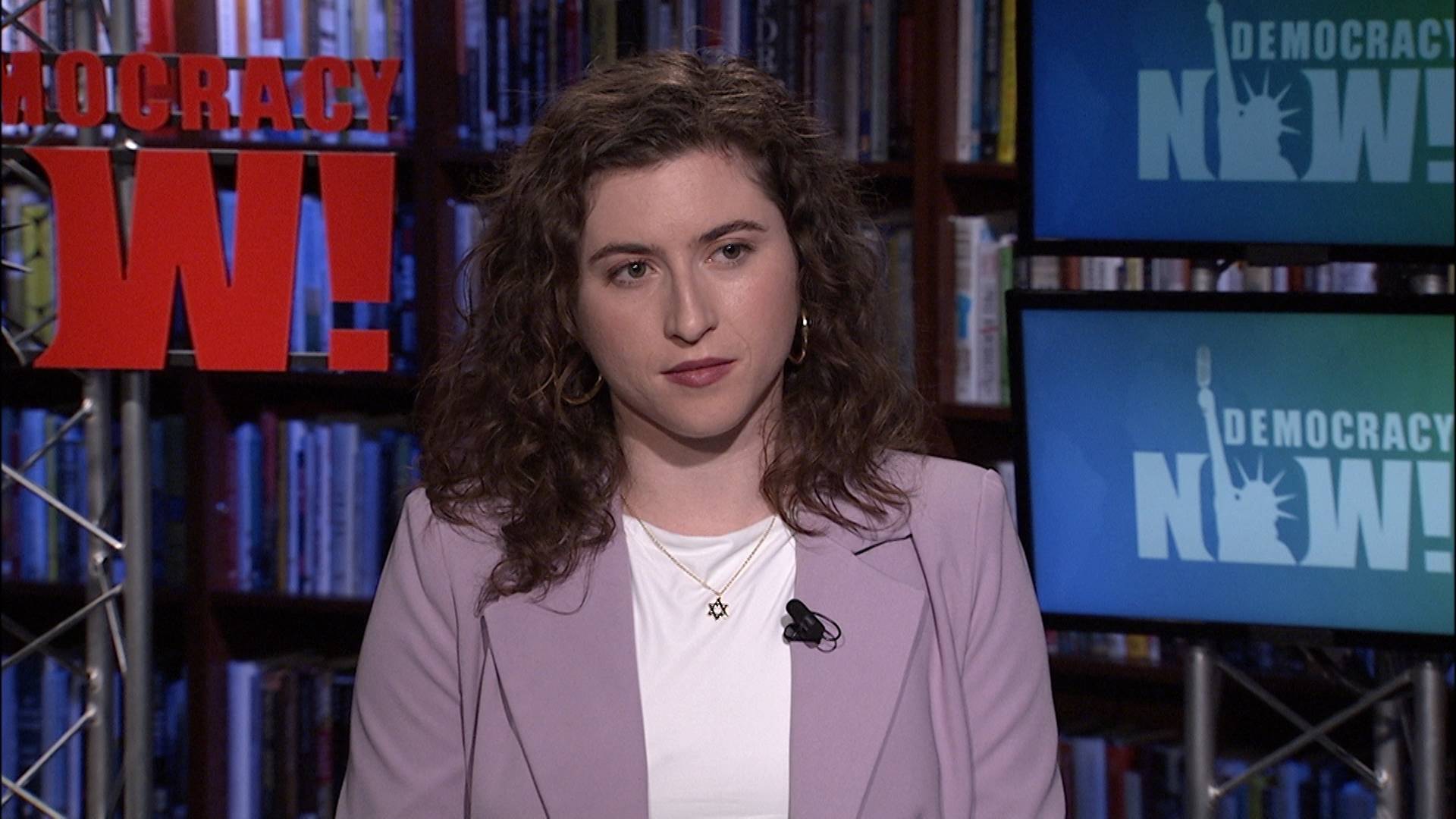This is a rush transcript. Copy may not be in its final form.
AMY GOODMAN: On May 15th, Lily Greenberg Call, a special assistant to the chief of staff at the Department of the Interior and a political appointee of President Biden, resigned from her position in protest of the administration’s policies in Gaza. In doing so, she became the first known Jewish appointee to resign from the Biden administration over Gaza.
In a four-page letter of resignation she released publicly, Greenberg Call wrote, quote, “I can no longer in good conscience continue to represent this administration amidst President Biden’s disastrous, continued support for Israel’s genocide in Gaza,” unquote.
Lily Greenberg Call chose May 15th as the date of her resignation because it marked the anniversary of the Nakba, Arabic for “catastrophe,” when up to 900,000 Palestinians were driven from their homes and displaced in 1948 during the founding of Israel. In her resignation letter, she wrote, quote, “Nakba and Shoah, the Hebrew word for Holocaust, mean the same thing: catastrophe. I reject the premise that one people’s salvation must come at another’s destruction. I am committed to creating a world where this does not happen — and this cannot be done from within the Biden administration,” she wrote.
Lily Greenberg Call joins us today in our New York studio.
Lily, welcome to Democracy Now! Thanks so much for joining us. If you can talk about the significance of the date you chose and why you have decided to resign?
LILY GREENBERG CALL: Thanks for having me, Amy.
So, as I said in my resignation letter, you know, “Nakba” and “Shoah” mean the same thing. I was raised with a fairy tale about the Nakba. The Nakba was something that I was not really told about. And if anything, it was minimized and trivialized. Was raised with this idea that Israel was a land without a people for a people without a land. And, you know, so if there’s no Palestinian society, if there’s nothing to be destroyed, then there’s nothing to mourn. So I felt, as a Jewish person, that it was particularly important for me to acknowledge the significance of the Nakba, and the Nakba that has never really ended, that continues to this day.
And, you know, as I mentioned, there’s something devastating about the parallels between the same word, “Nakba” and “Shoah,” and the idea that what Jews see as our — what many Jews see as our salvation in the formation of the state of Israel came at the expense of Palestinian freedom. And so I want us to reject that premise, the idea that Jewish safety and Palestinian freedom are at odds with each other, and understand that any system that requires that, you know, requires the oppression of one people for another, is inherently unsafe.
JUAN GONZÁLEZ: And could you tell us: How did your Jewish faith lead you to make this decision?
LILY GREENBERG CALL: Yeah. So, I mean, I was raised very much steeped in Jewish community. I went to Jewish day school. I have like 20 years of Jewish education. I did, you know, traditional Jewish text study in high school. And a lot of the values that I learned in that, I internalized some really beautiful values, right? There’s this idea of pikuach nefesh in Judaism, which means “saving a life,” and it supercedes any other commandment. You are allowed to break any commandment if it means saving a life. We also say, “To save a life is to save the whole world.” There’s this idea of b’tselem elohim, that every person is made in the image of God. And so, those values, in addition to the fact that Judaism is really steeped in a justice-oriented ethos, that we fight against authority — you know, Jews have been the victims of injustice, of legal injustice, of violence, of persecution, of displacement throughout our history, right? So, I feel that I am really living in my Jewishness, in the essence of what I was raised with, by standing up for Palestinians and by demanding their freedom.
JUAN GONZÁLEZ: And your views on the Israeli state have evolved over the years. In 2019, as a college student at UC Berkeley, you served as president of Bears for Israel, which is affiliated with AIPAC, the American Israel Public Affairs Committee. Could you talk about the evolution of your views?
LILY GREENBERG CALL: Yeah, of course. So, you know, as I mentioned, I was raised in a very — I was raised deeply involved in Jewish community. And within that community, it was very pro-Israel. There was no daylight between being Jewish and support for the state of Israel in the community I was raised in. And I also — you know, I believed in Israel as, like I said, the sort of salvation of the Jewish people, the way to protect Jews from antisemitism. And I grew up experiencing antisemitism from non-Jewish people in my life and in communities, and so it was really powerful for me to advocate for Israel.
But I would say, you know, as I got a little older, over the past eight years or so, two things started to happen at once, or at the same time. So, the first was that my world started to expand. I was able to get to know Palestinians, Palestinian Americans. I worked with some Syrian Palestinian refugees in Greece. I saw for myself some of the injustices that Palestinians face in Israel-Palestine — the checkpoints, you know, the system of apartheid — and started to — you know, they didn’t feel in alignment with my values — right? — and with the kind of country that — you know, the kind of world that I want to live in. So, that was happening. I also studied Arabic and just had all this exposure to Palestinian culture and life.
And at the same time, the coalition of people that I was advocating for Israel with through AIPAC started to move to the right, as Trump came to power, as the Israeli government shifted to the right. And I started to see these people who I had spent years doing pro-Israel advocacy with, in particular, you know, the evangelical Christians, support Trump and support right-wing fascists here in the United States and people who were aligning themselves with white supremacists and antisemites, right? And so, I started to realize, OK, maybe these people aren’t here because they’re invested in Jews and Jewish safety, you know, that there wasn’t — they couldn’t be — they couldn’t care about us if they were aligning with people who were so clearly antisemitic and harmful to my communities.
And so, both of those things together led me to this realization that I had been told a lie — right? — and that the status quo is untenable, and that not only is it devastating for Palestinians — right? — but I think October 7th made it very, very clear that it also doesn’t keep Israelis safe, and that if we wanted to actually create of thriving future for Israelis, for Palestinians, for Jews, for the communities that we care about here in America, something has to change.
AMY GOODMAN: I wanted to play some of what President Biden had to say earlier this month at the U.S. Holocaust Memorial Museum’s Days of Remembrance.
PRESIDENT JOE BIDEN: Driven by ancient desire to wipe out the Jewish people off the face of the Earth, over 1,200 innocent people — babies, parents, grandparents — slaughtered in their kibbutz, massacred at a music festival, brutally raped, mutilated and sexually assaulted.
AMY GOODMAN: President Biden made those comments in April. In December, he spoke at a Hanukkah holiday reception at the White House.
PRESIDENT JOE BIDEN: My commitment to the safety of the Jewish people and the security of Israel and its right to exist is independent — as an independent Jewish state is unshakable. Folks, were there no Israel, there wouldn’t be a Jew in the world who was safe — were there no Israel.
AMY GOODMAN: Lily Greenberg Call, your response?
LILY GREENBERG CALL: I don’t think Jews are safe right now. And I don’t think it’s — you know, I think that part of that is the status quo in Israel. And what makes Jews less safe is these comments from President Biden. I think, you know, continually using this message of Jewish safety as a smokescreen for Israel’s slaughter of Palestinians makes Jews less safe. It enables antisemitism.
And I just want to say that, of course, what Hamas did on October 7th is atrocious. There were people in my community among those people that he’s speaking about. But it’s very clear that the Israeli government is not prioritizing bringing the hostages home. You know, if they cared about that, they would not be bombing the densely populated area that they’re in.
And, you know, again, I am so angry at the president that he is using my community as justification for the slaughter, making us the face of the American war machine. I don’t think that makes us safe. And if he really cared about Jewish safety, he wouldn’t be doing that.
JUAN GONZÁLEZ: I wanted to ask you what the reaction has been among your former colleagues in the Biden administration. You worked both for Kamala Harris and for President Biden. What’s your sense of the people within the bureaucracy of government, how they’re feeling about the continuing American support for Israel’s war in Gaza?
LILY GREENBERG CALL: There’s widespread sentiment within all levels of the administration and all agencies that the president’s continued support for Israel’s assault on Gaza is disastrous. It’s disastrous for American foreign policy, for sentiment towards Americans abroad. It’s disastrous here at home. And it’s very devastating that the leadership of the administration is not only not listening to their colleagues, but to the majority of the American people, who want a ceasefire, who are horrified by what’s happening in Gaza, and who have made their voices very clear.
AMY GOODMAN: Talk about the power of AIPAC right now. And do you think it’s diminishing, the American Israel Public Affairs Committee? And also, do you feel that the consensus, the Democratic establishment consensus, is breaking at this point? On the one hand, you have these massive protests across the country, President Biden saying, no, he’s not listening to them. Then he says he’s halting 2,000-pound bombs to Israel. But then, within a few days, he announces a billion dollars’ worth of weapons to Israel.
LILY GREENBERG CALL: Yeah, you know, I think the Democratic Party, in particular, has to make a choice. They have to decide if they’re going to align themselves with a group like AIPAC, that supports and funds and enables insurrectionists and white supremacists, and take money from the same people who fund the NRA and Big Oil, you know, people — those groups are completely blacklisted from the Democratic Party. So, are we going to align ourselves with those people and take money from them? Or are we going to choose to uplift and support progressive champions who are fighting for a multiracial democracy and the type of country that we know that we deserve and that we want? And yeah, I do think the consensus is starting to shift a little bit. I think AIPAC realizes that their power is diminishing in particular within the Democratic Party, which is why they are making this kind of shift to the right. And I think, yeah, again, the Democratic Party has to make a choice.
AMY GOODMAN: And your journey from AIPAC and CAMERA — if you can explain what that is — to where you are now? And if you’re finding more and more of your friends back then are actually shifting?
LILY GREENBERG CALL: I think so, yeah. Again, I think it is very challenging and hard to — you know, when you grow up in the communities that I’m from, it’s very hard to change. And also, you know, a lot of Jewish people, unfortunately, we have internalized this message that Jewish safety and Palestinian freedom are at odds with each other — right? — and that to ensure the safety of the Jewish people, this is unfortunately the — we have to be OK with the status quo and with what Israel is doing. And I understand that. I understand our fear of annihilation after the Holocaust. I understand the fear of antisemitism. I feel it in myself. But we cannot let that fear blind us and trick us into somehow thinking — you know, into accepting the slaughter of Palestinians. And I really urge people in my community to think about what it means for us to accept that and to be the face of that.
AMY GOODMAN: Finally, the response within the Interior Department? I mean, the secretary of interior is the first Native American cabinet member, first Indigenous cabinet member, the former New Mexico congressmember, Deb Haaland. Her response?
LILY GREENBERG CALL: Yeah, I mean, a lot of folks that I know across the administration have been supportive and understanding. You know, like I said, there is widespread dissent and sentiment within the administration that what the president is doing is disastrous. And, you know, I’ll say that I may no longer be in the federal government right now, I might not be in this administration, but I do feel that I am here upholding my oath that I took to serve the American people, to listen to them. And I’m fighting for a country that we deserve, for a shared future for Israelis and Palestinians and for our communities here in America. And I don’t see that the president is doing that.
AMY GOODMAN: Lily Greenberg Call, thanks so much for being with us, the first known Jewish political appointee to resign over President Biden’s policies on Gaza. She had been working as special assistant to the chief of staff at the Interior Department. She also worked for Biden’s election, as well as Kamala Harris’s.
Coming up, President Biden condemns the International Criminal Court’s decision to pursue arrest warrants for Israeli Prime Minister Benjamin Netanyahu and the defense minister. We’ll speak with war crimes prosecutor Reed Brody and the renowned Israeli historian Ilan Pappé. Stay with us.











Post comments (0)